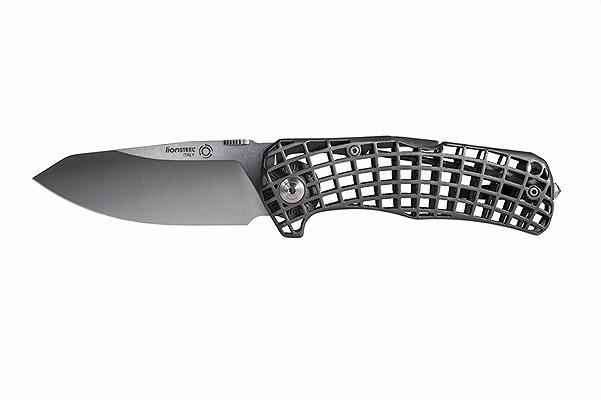One to Watch: Lionsteel TiDust
Tony Sculimbrene 02.17.15

I remember when I first starting buying and using knives, and $100 seemed like a ton to spend on a blade. When I first saw the price tag on a Sebenza I scoffed. Years later, both $100 and $300 is still a lot to spend on a blade, but it’s something I have done a few times. I have yet to pull the trigger on a Rockstead, so I guess that qualifies as financial prudence. Rocksteads have been the high water mark in terms of price and innovation in the production world for a very, very long time. But all that changed at Blade 2014.
Lionsteel has made a name for itself both as an OEM (the LionSpy and the Hi Jinx are two OEM projects) and as its own brand (the SR-1 and the TiSpine are great examples of their own work). They have been known for bold lines and insanely complex machining. They are the only source for carbon fiber integrals that I know of, custom or production. Integrals are knives that have a solid handle, there are no slabs. Most of the time this involves a ton of complex machining, and that is something that has been Lionsteel’s forte for a while now. The SR-1, even a few years later, strikes me as a truly innovative tool. The TiSpine is 100% lust-worthy too with its elegant blade shape and beautiful handle (it’s an integral too).
But Lionsteel didn’t get the reputation has being the most innovative maker in the world by resting on their laurels. At Blade 2014 they announced a titanium handled integral that was made through the additive materials process (aka 3D printing). The knife, known as the TiDust, won awards and inspired many slack-jawed staring fits. Until that knife, 3D printing in the consumer world had been confined to plastics and the occasional aluminum item. Nothing had the strength of titanium, nothing, that is, until the TiDust. The knife’s silhouette is borrowed from the TM-1, another Lionsteel integral, and the source material is impressive. The TM-1 has a reverse tanto-ish blade with a lock back and caged bearings. How they did caged bearings in an integral is beyond my puny brain to imagine.
When it was debuted the TiDust was like a concept car–Lionsteel proved they could do 3D printed titanium. And while they promised it would be released, I was, like many others, skeptical it would come out. After all, the Blade award winners, especially the KAI-produced ones, have a troubling history of not actually making it to market in any sizable number. But in late December, a few months after the promised launch date on the Lionsteel site, the TiDusts were available to buy.
Of course they are limited in number. They have a completely skeletonized frame, something that would be darn near impossible without the 3D printing process, and they are light as a feather. But the real shocker, aside from the tech, is the price. With the dollar to euro conversion as it is right now, they are selling for around $1,750. You know a knife is expensive with currency conversion is part of the purchase calculation. And so there is a new high water mark in production knives both in terms of innovation and in terms of price, and it is the Lionsteel TiDust–the new Bugatti Veyron of folders.